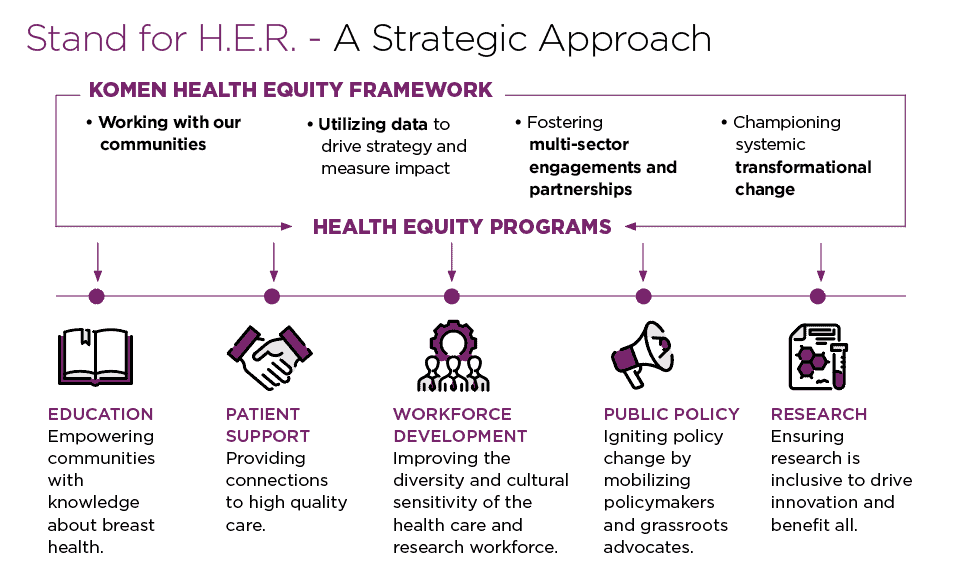
Breast cancer is a concern for everyone, but it is a tragedy for the Black community. Breast cancer is the most common cancer among Black women in the U.S. Additionally, current data show Black women in the U.S. are about 40% more likely than white women to die of breast cancer, and they are also more likely to be diagnosed at an earlier age, at a later stage and with more aggressive types of tumors.
In a recent analysis, Komen found some of the primary contributing factors driving disparities for Black women are that the concerns and individual needs of Black women are often ignored by their health care providers. Black women also face significant barriers to care due to a legacy of implicit bias, systemic racism and below-standard care.
At Susan G. Komen®, we believe every person has a just opportunity to be as healthy as possible. Komen’s Stand for H.E.R. – a Health Equity Revolution is our comprehensive program designed to address the disparities in breast cancer outcomes experienced by Black women across the U.S. using five key health equity drivers of change: Patient Support, Education, Workforce Development, Research, and Public Policy and Advocacy.
Our recently published Stand for H.E.R. – A Health Equity Revolution Impact Report demonstrates Komen’s commitment and work to achieve health equity for the Black community and documents our progress over the past year, as told through the stories of the people impacted by this work.
Report Highlight #1: Patient Support – Members of the Black community overcome barriers to care across the breast health continuum through individualized, direct patient care delivered by Komen’s Patient Care Center (PCC).
- Komen’s PCC provides direct support to Black patients through our staff of highly skilled and culturally responsive patient navigators. Komen’s navigators provide access to high-quality care, financial assistance, emotional support and more, all available at no cost through Komen’s Breast Care Helpline.
Report Highlight #2: Education – Meet the need for more cancer education programs tailored to the Black community and provide culturally relevant and responsive educational resources and programs.
- Because Black women are not recommended to receive genetic counseling and testing by their health care provider at the same rate as white women, they do not receive genetic testing as often. Komen offers genetic counseling and testing (GCT) educational resources tailored to the Black community, explaining the benefits of GCT and the importance of knowing your family’s health history.
- Komen’s Worship in Pink (WIP) program trains volunteer members of the Black community to become WIP Ambassadors. WIP Ambassadors amplify the conversation about breast health within their faith-based organizations, which are safe havens and vital spaces of trust and fellowship in the Black community.
Report Highlight #3: Workforce Development – Develop a more diverse workforce by preparing the next generation of health care leaders, representative of the diverse populations they serve, through workforce training programs.
- Through our disparities-focused research grants, like the ASPIRE (A Supplement to Promote Inclusion for Research Excellence) grant, we support the professional development of promising trainees from underrepresented communities who are early in their research careers.
- Komen’s Patient Navigation Training Program educates, equips and mobilizes Black patient navigators across the nation to deliver high-quality, culturally responsive navigation services.
Report Highlight #4: Research – Save more lives and provide hope for the breast cancer cures of tomorrow by advancing health equity through our scientific research programs.
- Komen provides funds for cutting-edge research to help understand and resolve the many factors that contribute to breast cancer disparities.
- Through our Advocates in Science program, Komen trains patient advocates who represent all people diagnosed with breast cancer and who bring a diverse patient voice to research.
Report Highlight #5: Public Policy – Ensure all people have equitable access to high-quality breast health care through Komen’s Center for Public Policy (CPP) by supporting sound government actions that overcome barriers and make broad, systemic and lasting change.
- Komen’s Advocacy Ambassador program trains diverse advocates that better represent those impacted by breast cancer to use their voices to make policy changes in their communities.
- The CPP’s Speak Truth to Power program educates Black community leaders and advocates about the role of policy in addressing breast cancer disparities experienced by Black women in the U.S.
Conclusion/Standing Together with the Black Community through Stand for H.E.R.
Komen will not stop until everyone has equal access to the high-quality care they need so we can achieve our vision of a world without breast cancer. To learn more about our progress through the stories of people impacted by this work, read the full 2023 Stand for H.E.R. Breast Cancer Impact Report here.


